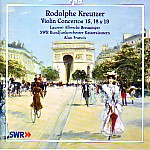Rodolphe Kreutzer was one of a trio of great French violinists (the others were Rode and Baillot), all followers of Viotti, who set the standard of string playing excellence in the first decades of the 19th century. Like most violin virtuosos of the day, his concertos were all written for his own use; after an injury forced his retirement from solo playing, he stopped writing them. This partly explains why they disappeared over the ensuing decades everywhere but in violin treatises or as exercises given to students. They are superbly written for the violin, but boring in other respects. Indeed, if you look at the scores it becomes clear that they were intended as much for the eye as for the ear. To make their full effect, you need to see a virtuoso standing in front of the orchestra, fiddling like mad. However, yesterday’s virtuosity fades, and after Paganini, works such as this lost even that element of appeal.
This doesn’t mean the music is all bad, or tasteless in the later, Romantic sense of consisting merely of empty virtuosity for its own sake. The slow movement of Concerto No. 18 is very beautiful in its troubled, minor-key lyricism, while that of No. 19 features some attractive writing for violin and woodwinds. In the opening movements Kreutzer’s formulaic handling of structure and melodic short-windedness dooms them from the start, and they are the longest parts of each concerto. The concluding rondos however, despite their cookie-cutter construction, do feature some appealing tunes and a charming episode now and again. The two minor key works, Nos. 18 and 19, certainly are the most interesting. Concerto No. 15, in A major is frankly just plain tedious.
Violinist Laurent Albrecht Breuninger isn’t a bad soloist, but he has some peculiarities of technique that don’t suit the music particularly well. The first of these is his tendency to smudge rather than articulate ornamentation and passage-work, a fault I noted in his previous outings for this label. Also, his high register tends to sound thin, and this gives the music a whiny, hectoring quality that’s surely far from what Kreutzer intended. Finally, despite the fact that Breuninger correctly refuses to stint on vibrato, he could vary his tone more characterfully. Alun Francis and the SWR orchestra accompany reliably, but then they really don’t have that much to do. At bottom, though, what we have are not great performances of not great music.
































